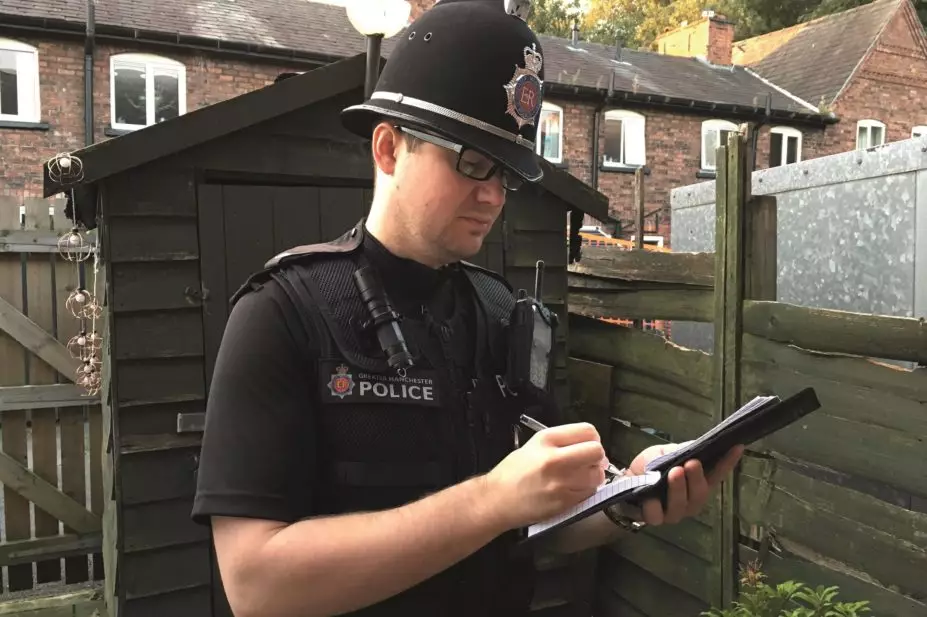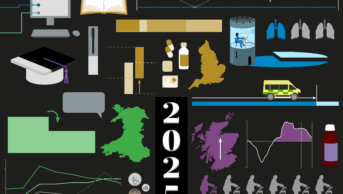
Courtesy of Adam Grainger
Adam Grainger splits his time between working as a senior medicines performance pharmacist and a special constable for the police. Here, he describes the intense training programme and dangerous nature of the role.
What made you decide to train as a special constable for the police force?
I have been a pharmacist for around eight years. I completed my preregistration training in hospital and worked as a hospital pharmacist for six years before moving into primary care as a GP support pharmacist. While working there I had the opportunity to do some work in two of the local prisons and loved it. I became the lead pharmacist and stayed in that role for around a year.
Despite this, my real passion in pharmacy has always been writing evidence reviews. I particularly enjoyed my medicines information rotation in hospital and when a similar position at a nearby commissioning support unit (CSU) became available, I had to apply. I am now the senior medicines performance pharmacist at NHS Midlands and Lancashire CSU.
Personally, I have always been fascinated by the role of a police officer. My best friend’s father was an inspector with Lincolnshire Police and I loved listening to his grimy accounts of criminal activity. My friend joined the force himself about ten years ago and, as I listened to his stories and reflected on my experience of interacting with offenders in prison, I decided it was my turn to join. Because I love my job as a pharmacist, becoming a full-time police officer was not an option so becoming a special constable — a person who is trained to act as a police officer on particular occasions, especially in times of emergency — seemed like the ideal choice.
What training did you have to do to qualify as a special constable?
I completed a 26-week training programme with Greater Manchester Police. The syllabus is the same as that completed by a regular police officer although, because the majority of the teaching is done at weekends, it is over a longer period.
We were all gassed to see what it is like — horrible
We were initially taught the nuts and bolts of police procedure, including arrest powers and procedure and securing evidence, alongside the most relevant parts of the criminal law, such as assaults, misuse of drugs and burglary.
We then had structured assessments (similar to objective structured clinical examinations [OSCEs]) once the law teaching had finished, which were pass or fail. Everything we had learnt to that point was examined. It was tough and the instructors were honest.
Fortunately, I passed and I progressed on to the officer safety training (OST). This was a two-week intensive course on: self-defence, hand-cuffing, baton-striking, restraint techniques, public order tactics and CS [tear] gas use. We were all gassed to see what it is like — horrible.
We then had another practical examination and, once everything was completed, we had our attestation. We all took the declaration to “faithfully discharge the duties of the Office of Constable” in front of a magistrate and we were presented with our warrant cards. It is at this point that you become a police officer.
What tasks and responsibilities do you have as a special constable?
I try to dedicate as much time as possible to policing but the minimum you are expected to dedicate is an average of four hours per week. Training sessions are at least once per month and our OST and first aid skills are refreshed annually.
The training is good and the police will try to accommodate any training requests you have. For example, our training intake attended a detective-level course on dealing with domestic violence. It was both harrowing and insightful. We have some training booked on child sexual exploitation, which is also distressing but, unfortunately, this is part of everyday life. Additionally, I am currently putting together a training session for the police regarding the misuse of drugs and medicines.
As a special constable I have the same police powers as a regular constable — on and off duty, 365 days a year, throughout England and Wales. We wear exactly the same uniform and have exactly the same responsibilities as our regular colleagues. When completing a tour of duty (or shift) we get called to the same incidents, face the same risks and the people we are there to help have the same expectations of us. Even though we are not paid, we are there to provide a professional police service to the people of Greater Manchester.
For example, my first job on my first shift involved 20 people fighting in a side street with knives, hammers and garden spades. Fortunately, I was not on my own but the public rightfully expect the police to take charge of these situations and protect them while dealing with any offences that have been committed. It does not matter if you are new to the role, scared, tired or a volunteer. You have to act with fairness, integrity, diligence and impartiality — these are central to the declaration that is taken.
What has been the most interesting thing to happen to you on a shift so far?
My first arrest! We had reports of a male threatening people with a ten-inch hunting knife in a residential street. I was discussing the situation with my colleague before we arrived and he asked me if I wanted to take the arrest – the man would have to be arrested given the reports that were coming in. While the siren blared and blue lights reflected off the building as we sped through the streets, I was desperately trying to remember the correct procedures, techniques and laws that would need to be applied. Then, we saw him and pulled the car alongside him. I jumped out of the car and ran after him. The knife was big but, luckily, he threw it into someone’s garden. I detained him, arrested him, cautioned him and cuffed him. The training is good so it all seemed perfectly natural.
It turned out he had been arrested many times and he even gave me some feedback on my arrest technique, which was very good apparently. He was being perfectly reasonable and civil with me and I had no reason not to treat him with the same respect. Had I not done so, the situation may have become much more dangerous. I have always attempted to treat everyone I meet, personally or professionally, with respect and this applies, too, while wearing a police uniform.
You need to be able to talk to and relate to people to succeed as either a pharmacist or a police officer
What is the most difficult thing for you about being a special constable?
Dealing with tiredness can be challenging. I have a busy life with work and children so adding an eight-hour shift once a week can be tough. I try to do my shift on Fridays so at least I have a chance to rest at the weekend.
Handling situations involving children can also be hard. It is difficult and saddening to see how some children live. If needed, police contact can lead to interventions from other agencies, which we hope will improve their circumstances. In extreme cases we can take children into temporary police protection but, fortunately, I have not had cause to do this yet.
When I joined I did have concerns about there being a possible conflict of interest with being a pharmacist. Being in a non-clinical role does help me reconcile this. I also turned to the Royal Pharmaceutical Society for advice and the support team advised me that the roles were compatible.
How do you think your role as a pharmacist has prepared you for this new position?
Being a pharmacist prepared me well. Effective communication skills are essential if you are thinking about being a police officer. Communication permeates every aspect of police training — even in self-defence and public order training the central premise is tactical communication.
Documentation is another important skill. You need to be able to talk to and relate to people and record what you have done accurately to succeed as either a pharmacist or a police officer. Without these skills it would be difficult to soothe, inform, educate, negotiate with or use force on individuals and then justify your decision.

